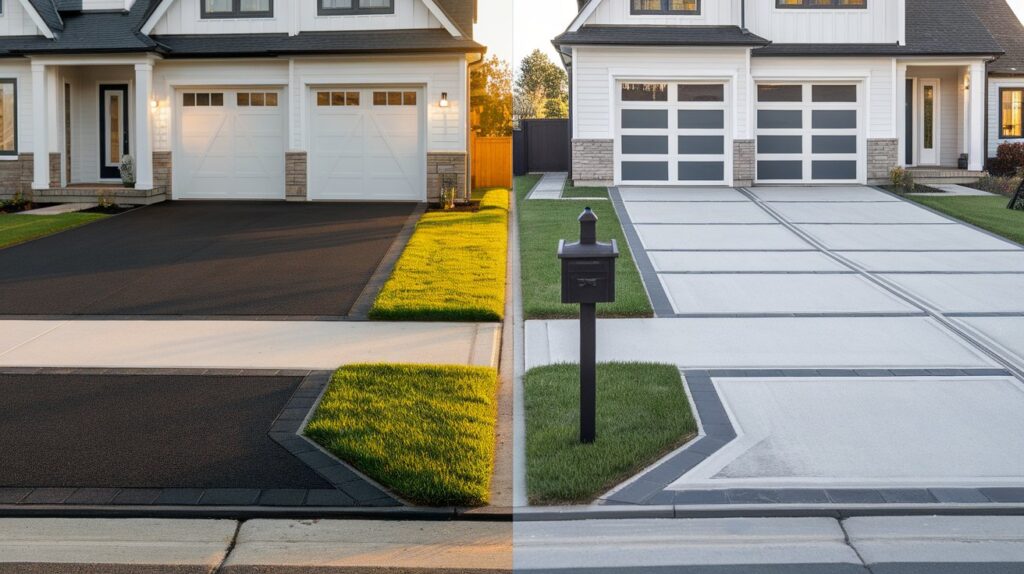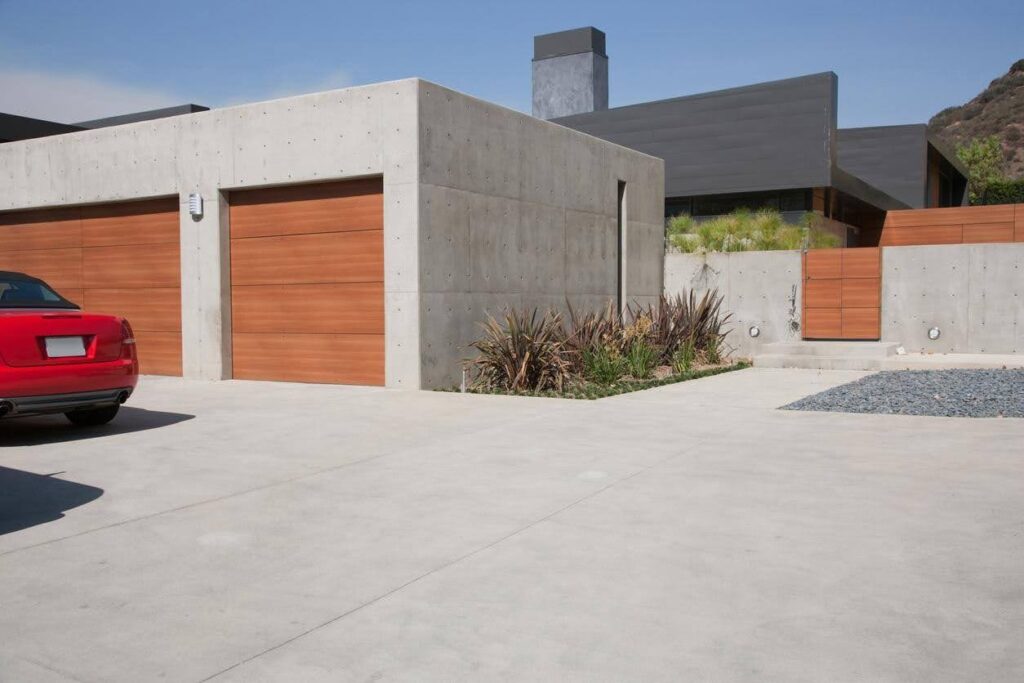Asphalt is affordable, flexible, and ideal for cold climates, offering a sleek black finish but requiring sealcoating every 3-5 years. Concrete provides longevity, low maintenance, and customizable designs but comes at a higher cost and is less suited to freeze-thaw cycles. For budget-conscious homeowners in colder regions, asphalt is practical. Those seeking elegance and durability may prefer concrete. Your choice depends on climate, budget, and aesthetic preferences.
Your driveway is more than just a pathway to your garage-it’s an integral part of your home’s functionality and curb appeal. Imagine hosting a summer barbecue with friends or welcoming guests during the holidays; the condition and appearance of your driveway set the tone for their entire experience.
Choosing the right material for your driveway requires careful thought. Factors like budget, climate, and maintenance preferences play a pivotal role in determining which option suits your needs. For instance, if you live in an area with harsh winters, materials that can withstand freeze-thaw cycles are essential. Similarly, aesthetic considerations matter if you’re aiming for a modern or classic look. Consulting professionals who specialize in driveway paving in Calgary or your local region can provide valuable insights tailored to your situation.
In this article, we’ll explore the pros and cons of asphalt and concrete driveways, helping you make an informed decision that aligns with your priorities. Whether you’re building a new home or upgrading your existing driveway, understanding these materials will empower you to choose wisely.
Understanding Asphalt Driveways
Asphalt driveways dominate residential landscapes across Canada and beyond, thanks to their affordability, durability, and versatility. But what makes asphalt such a popular choice among homeowners? Let’s break it down.
Benefits of Asphalt
Affordable Investment
Asphalt is significantly cheaper than concrete, making it an attractive option for homeowners working within a tight budget. On average, asphalt installation costs range from $2 to $5 per square foot, compared to $4 to $8 for concrete. This cost difference allows families to allocate funds toward other home improvements.
Flexibility in Extreme Weather
One of asphalt’s standout features is its ability to flex with temperature changes. In colder climates, where freeze-thaw cycles are common, asphalt’s malleability reduces the risk of cracks caused by ground movement. This flexibility secures your driveway remains intact even during unpredictable weather patterns.
Quick Installation Process
Unlike concrete, which requires curing time, asphalt driveways can be driven on shortly after installation. This means less disruption to your daily routine and faster access to your property.
Enhanced Curb Appeal
The smooth, jet-black finish of asphalt creates a sleek, uniform look that complements virtually any home style. It’s particularly effective at hiding minor imperfections, providing a polished appearance without extensive upkeep.
Potential Drawbacks
Shorter Lifespan Without Maintenance
While asphalt is durable, it doesn’t last as long as concrete unless properly maintained. Regular sealcoating every 3-5 years is necessary to protect against UV rays, water damage, and oil spills. Skipping this step can lead to premature wear and tear possibly with the need of asphalt driveway repair.
Heat Retention Concerns
Asphalt’s dark color absorbs heat, which can make it uncomfortably warm to walk on during hot summer months. Additionally, excessive heat may cause the surface to soften slightly, increasing the risk of scuff marks from tires.
Susceptibility to Oil Stains
Oil leaks from vehicles can penetrate the porous surface of asphalt, leaving unsightly stains. Prompt cleaning is essential to prevent permanent discoloration.
Exploring Concrete Driveways
Concrete driveways are often seen as the premium choice for homeowners seeking longevity and sophistication. Known for their durability and versatility in design, concrete driveways can elevate your property’s aesthetic while offering decades of reliable performance. But what exactly sets concrete apart, and are there any downsides to consider?
Advantages of Concrete
Exceptional Longevity
Concrete driveways are built to last. With proper care, they can endure 30-40 years or more, outlasting asphalt by a significant margin. This makes them an excellent investment for homeowners planning to stay in their homes long-term.
Minimal Maintenance Requirements
Unlike asphalt, which needs periodic sealcoating, concrete requires little upkeep beyond occasional cleaning and sealing (every 5-10 years). This low-maintenance aspect appeals to busy homeowners who prefer a “set it and forget it” solution.
Customizable Aesthetics
One of concrete’s standout features is its ability to be customized. From stamped patterns that mimic stone or brick to colored finishes that add a touch of elegance, concrete offers endless design possibilities. This flexibility allows you to create a driveway that reflects your personal style and complements your home’s architecture.
Eco-Friendly Benefits
Light-colored concrete reflects sunlight rather than absorbing it, reducing heat retention and contributing to cooler surface temperatures. This quality not only enhances comfort but also helps mitigate urban heat island effects-a growing concern in many communities.
Key Limitations
Higher Upfront Costs
The initial cost of installing a concrete driveway is substantially higher than asphalt, often ranging from $4 to $8 per square foot. For some homeowners, this steep price tag may outweigh the long-term benefits.
Prone to Cracking in Extreme Conditions
While concrete is incredibly strong, it lacks the flexibility of asphalt. In regions with frequent freeze-thaw cycles, concrete can develop cracks if not installed with proper reinforcement or expansion joints. Once cracks form, repairs can be costly and time-consuming.
Longer Installation Time
Concrete requires several days to cure before it can bear weight. This extended installation period may inconvenience homeowners who need immediate access to their driveways.
Staining and Discoloration
Concrete is porous, making it susceptible to stains from oil, grease, and other substances. Additionally, exposure to UV rays over time can cause discoloration, detracting from its original polished appearance.
Asphalt vs. Concrete: A Detailed Comparison
Choosing between asphalt and concrete driveways can feel overwhelming, especially when both materials offer distinct advantages. To simplify your decision-making process, let’s compare these two options across several key factors. This breakdown will help you weigh their strengths and weaknesses objectively.
Cost Analysis
Cost is often one of the first considerations for homeowners. Asphalt is significantly more affordable upfront, with installation costs typically ranging from $2 to $5 per square foot. Concrete, on the other hand, averages $4 to $8 per square foot, making it a pricier investment. While asphalt may require more frequent maintenance (e.g., sealcoating every 3-5 years), its lower initial cost makes it an attractive option for budget-conscious families. Concrete’s higher price tag reflects its longevity and minimal upkeep, but it might not be feasible for everyone.
Durability and Lifespan
When it comes to durability, concrete takes the lead. A well-maintained concrete driveway can last 30-40 years or more, while asphalt typically lasts 15-20 years-even with regular maintenance. However, asphalt’s flexibility gives it an edge in colder climates, as it can expand and contract without cracking. Concrete’s rigidity makes it more prone to damage during freeze-thaw cycles unless installed with proper reinforcement. For homeowners in regions with harsh winters, asphalt’s resilience is a significant advantage.
Maintenance Requirements
Maintenance plays a crucial role in extending the life of any driveway. Asphalt requires periodic sealcoating to protect against weathering, UV rays, and oil spills. Without this care, its surface can degrade faster. Concrete, by contrast, demands less frequent attention-typically sealing every 5-10 years-but it’s not entirely maintenance-free. Stains from oil leaks or discoloration from prolonged sun exposure may require professional cleaning or touch-ups.
Aesthetic Appeal
Aesthetics are subjective, but both materials cater to different tastes. Asphalt offers a sleek, uniform black finish that enhances curb appeal with minimal effort. Its simplicity makes it versatile, blending seamlessly with any home style. Concrete, however, shines in customization. Options like stamped patterns, exposed aggregates, and colored finishes allow homeowners to create a driveway that doubles as a design statement. If you’re looking for elegance and uniqueness, concrete is hard to beat.
To summarize, here’s a side-by-side comparison of asphalt and concrete:
|
Factor |
Asphalt |
Concrete |
|
Cost |
Affordable ($2-$5/sq ft) |
Expensive ($4-$8/sq ft) |
|
Lifespan |
15-20 years (with maintenance) |
30-40 years (low maintenance) |
|
Maintenance |
Sealcoating every 3-5 years |
Sealing every 5-10 years |
|
Aesthetics |
Sleek black finish |
Customizable designs & colors |
|
Climate Suitability |
Ideal for cold climates |
Better for mild climates |
|
Installation Time |
Ready within days |
Cures over several days |
Final Thoughts: Choosing What Suits You Best
Selecting the right driveway material is a decision that balances practicality, aesthetics, and long-term value. Both asphalt and concrete offer unique advantages, catering to different priorities and lifestyles. By carefully evaluating factors like budget, climate, maintenance preferences, and design goals, you can make a choice that enhances your home’s functionality and curb appeal.


